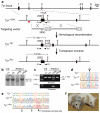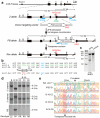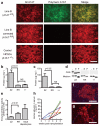Targeted gene correction of α1-antitrypsin deficiency in induced pluripotent stem cells
- PMID: 21993621
- PMCID: PMC3198846
- DOI: 10.1038/nature10424
Targeted gene correction of α1-antitrypsin deficiency in induced pluripotent stem cells
Abstract
Human induced pluripotent stem cells (iPSCs) represent a unique opportunity for regenerative medicine because they offer the prospect of generating unlimited quantities of cells for autologous transplantation, with potential application in treatments for a broad range of disorders. However, the use of human iPSCs in the context of genetically inherited human disease will require the correction of disease-causing mutations in a manner that is fully compatible with clinical applications. The methods currently available, such as homologous recombination, lack the necessary efficiency and also leave residual sequences in the targeted genome. Therefore, the development of new approaches to edit the mammalian genome is a prerequisite to delivering the clinical promise of human iPSCs. Here we show that a combination of zinc finger nucleases (ZFNs) and piggyBac technology in human iPSCs can achieve biallelic correction of a point mutation (Glu342Lys) in the α(1)-antitrypsin (A1AT, also known as SERPINA1) gene that is responsible for α(1)-antitrypsin deficiency. Genetic correction of human iPSCs restored the structure and function of A1AT in subsequently derived liver cells in vitro and in vivo. This approach is significantly more efficient than any other gene-targeting technology that is currently available and crucially prevents contamination of the host genome with residual non-human sequences. Our results provide the first proof of principle, to our knowledge, for the potential of combining human iPSCs with genetic correction to generate clinically relevant cells for autologous cell-based therapies.
Figures



Comment in
-
A ZFN/piggyBac step closer to autologous liver cell therapy.Hepatology. 2012 Jun;55(6):2033-5. doi: 10.1002/hep.25715. Hepatology. 2012. PMID: 22422378 No abstract available.
References
Publication types
MeSH terms
Substances
Associated data
- Actions
Grants and funding
LinkOut - more resources
Full Text Sources
Other Literature Sources
Medical
Molecular Biology Databases
Research Materials
Miscellaneous

